Papers by André Thiemann

Journal of Labor and Society, 2023
Extending from an ethnographic case study that demonstrates the existential troubles of Serbian f... more Extending from an ethnographic case study that demonstrates the existential troubles of Serbian farmers to continue raspberry production for the global market, this article anthropologically hones in on the intertwining of human and non-human labour (production) with socioeconomic and techno-scientific policies of care (reproduction). Different waves of state transformation-the build-up and decay of formal employment coupled with the emergence, then exhaustion of the welfare state, its socio-liberal transformation in the early 2000s, followed by its polypore repurposing for illiberal ends since 2012, have led to a zombified hope in the state's will to care for its population. Skilled and unskilled workers have emigrated to Western labour markets, while the climate crisis gained momentum because of the underfunding of critical infrastructures of value. Adopting a Marxist-Eco-Feminist care perspective, the case study thus embeds seemingly disconnected concerns within wider struggles on the boundaries of the (welfare) state, economy and techno-science.
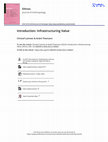
Ethnos, 2023
Exploring infrastructure has much to offer for economic anthropology. Inspired by the convergence... more Exploring infrastructure has much to offer for economic anthropology. Inspired by the convergence of literatures on value and infrastructure in studies of financialisation, we develop the analytics of ‘infrastructures of value’ on old terrain: agriculture. Infrastructure facilitates valuation practices and enables valorisation as fixed capital. Material networks emerging from practices of infrastructuring also mediate value by facilitating, channelling, or hindering the circulation – movement and metamorphoses – of objects, people and ideas. Shifting attention from the social life of things to the infrastructure undergirding their circulation fills a major gap in David Graeber’s theory of value: it directs attention to how actions become incorporated into larger wholes. Various infrastructures and the frictions between them shape value by connecting producers and consumers, separating contents, and communicating evidence of qualities of food. Ethnographic attention to this material relationality of value invigorates dialogue between new and historical materialism and challenges binaries in economic thought.

Ethnos, 2023
Serbia has exported raspberries since socialism. Its production network withstood the post-Yugosl... more Serbia has exported raspberries since socialism. Its production network withstood the post-Yugoslav property transformations and grew despite global competition. This article traces the configuration of the ‘infrastructures of value’ that underwrite the raspberries’ spatio-temporal reach to distant markets. Combining new and historical materialism, it contributes to economic anthropology by studying the interplay between two infrastructures – agronomics and the ‘cold chain’ – and their differential weathering of historical transformations. During socialism, the agronomists ‘infrastructured’ the environment in collaboration with farmers and plants, while the containment technologists upgraded the freezing infrastructure, solidifying the fruits into graded, storable, and transportable commodities. After socialism, private entrepreneurs replicated the cold-chain modules, while agronomic research and quality control became de-institutionalised. As the agronomic infrastructure stagnated, the cold chain went into overdrive. In this late-capitalist ‘infrastructural involution’, political-economic transformations reshaped multispecies infrastructures, devaluing the contributions of plants and rural labour while benefiting entrepreneurs and wholesalers.
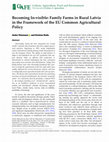
CAFE: Culture, Agriculture, Food and Economy, 2022
Historically, Latvia has been integrated into several (multi-) national state formations that hav... more Historically, Latvia has been integrated into several (multi-) national state formations that have shaped agricultural practices. Beginning in 1991, newly independent Latvia reintroduced a family farming model and prepared to join the European Union. The ability of small farmers to adapt to and implement the new EU regulations that support farming either as efficient food production or alternatively as cultural landscaping has been contingent upon many socioeconomic and cultural factors. Today, most family farmers have only reluctantly formalized their practices to satisfy the requirements of the EU, while others have readily embraced the current discourses, policies, and laws to strategically access agricultural funds and scale up operations. We discuss these agricultural tensions by contrasting two forms of selective formalization: the reluctant "projectification" of a subsistence farm by founding a cultural NGO vs. the strategic founding of an "entrepreneurial" cooperative of sea buckthorn producers to access transnational markets and development subsidies. [Common Agricultural Policy, family farms, Latvia, state in-visibility, modalities of farming]
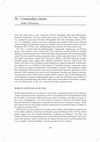
A Handbook of Economic Anthropology, 2022
There has always been a close connection between commodity chains and anthropology. Immanuel Wall... more There has always been a close connection between commodity chains and anthropology. Immanuel Wallerstein, who put forward the concept in the 1970s with Terence Hopkins, was inspired by processual Africanist ethnographers like Max Gluckman (Gordon 2018: xiii–xiv). Wallerstein wanted to trace how capitalism had extended itself from the fifteenth century through the nineteenth, becoming a capitalist, Western-dominated world-system (see Wallerstein 2011 [1974]: xviii). Anthropologists have reacted to this idea in three ways.
The first is critical historical-anthropological engagement, emphasising non-Western agency at the frontiers of the world-system. The second was marked initially by a hopeful embrace of, and then productive irritation and finally disenchantment with, neoliberal globalisation. This was marked by calling commodity chains ‘global commodity chains’ in the 1990s and ‘global value chains’ around 2000. These have affinities with other analytical concepts, including supply chains, supply-chain capitalism, production networks, clusters and value chains, each with its own orientation toward international capitalist production. Globalisation was analysed as a set of effects of the strategies of transnational firms, commercial sectors and countries to exploit cost differentials with peripheral locations. These globalisers shifted their unprofitable, labour-intensive and socio-environmentally hazardous operations to those locations while retaining their research and development, branding and financial planning. The destructive effects of this became evident with the economic crisis of 2008. Subsequently, a third approach emerged as anthropologists began to study the exploitation and resistance of human and non-human beings and entities within, against and tentatively beyond the ‘capitalocene’ (see Hirsch chap. 16, this vol.). I discuss these three reactions in turn.
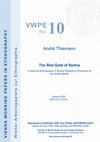
Vienna Working Papers in Ethnography, 2020
This paper presents the first historical ethnography of raspberry production in Serbia, using an ... more This paper presents the first historical ethnography of raspberry production in Serbia, using an example of two typical actors in a field of entanglement between local production and kinship, global markets and politics of science. Introducing a small-farming household and a manager-agronomist, it disentangles how raspberries became a major export commodity – the red gold of Serbia. This economic success is traced to configurations of the socialist Yugoslav development project since the mid-1970s, when the agricultural cooperative Arilje in southwestern Serbia assembled a complex production, processing, transport and commerce network at the intersection of state-financed science and technology and small-scale farming. During early post-socialism, this cooperative innovation became radically dispersed and production skyrocketed. However, this competitive fragmentation unravelled the collaboration
between agroscientists and farmers and aggravated the problems these actors face today, including labour shortages and price fluctuations because of a diminishing ‘quality’ of ‘their’ product.

Etnofoor, 2019
This ethnographic case study, building on long term participant observation in Serbia, tackles th... more This ethnographic case study, building on long term participant observation in Serbia, tackles the relationship of the state and the regional economy during the transformations from self-managed socialism to late capitalism. Embedding the work relations of small-scale dairy farmers from central Serbia in wider moral economic relations, it develops the notion of ‘moral appreciation’. On the one hand, moral appreciation is external to the dairy households, as many neighbours who disinvested from dairy production support those who invested – through labour exchanges, by renting land cheaply, and by praising their frugality. On the other hand, the dairy farmers themselves struggle to domesticate the post-socialist assemblage of changing standards and novel supply chains. Relationally speaking, moral appreciation encompasses salvaging value from the devalued substance of work – past and present – to reproduce the future ‘living village’. This adaptive process to capitalist substance-transformation is potentially paralleled in many other spheres of the capitalist world economy.

From the Midwife’s Bag to the Patient’s File: Public Health in Eastern Europe
This chapter details how urban social workers in postsocialist Serbia negotiate a longtime welfar... more This chapter details how urban social workers in postsocialist Serbia negotiate a longtime welfare relation with a rural family. In this case study of street-level bureaucratic agency, I analyze the history and effects of a post-Yugoslav relational modality of social work: inclusive distribution for families in need. This relational modality is pioneered through intentional bureaucratic error during the translation of consecutive laws. The intention of the social law of 1991 was to support the poor during the transformation to capitalism. In subsequent editions the letter of the law became more restricted. According to their professional ethics, the social workers "under-implemented" these new paragraphs. Overall I argue that where paperwork becomes ubiquitous, its value for professional local state actors decreases, especially in relation to increasing social issues and diminishing social policy responsiveness.
Glasnik Etnografskog instituta SANU, 2017
This ethnographic case study, building on long term participant observation in Serbia, tackles t... more This ethnographic case study, building on long term participant observation in Serbia, tackles the relationship of the state and the regional economy during the transformations from self-managed socialism to late capitalism. Embedding the work relations of small-scale dairy farmers from central Serbia in wider moral economic relations, it develops the notion of ‘moral appreciation’ to explain how many households who disinvested from dairy production supported – through labour exchanges, by renting land cheaply, and by praising the frugality of those few others – who invested. Moral appreciation means living from and salvaging value from the devalued substance of work past and present, an adaptive process to capitalist substance-loss, potentially paralleled in many other spheres of the capitalist world economy.

Social Analysis, 2014
In this article, we analyze processes of kinning within state-initiated programs of elder care in... more In this article, we analyze processes of kinning within state-initiated programs of elder care in Serbia in order to explore how images of the state as an entity are cast as distinct from the domain of the family. We present data from the fieldwork we conducted in two settlements, in northern and central Serbia respectively. Contrary to the findings of many anthropological studies of the state, state actors in these cases surpass the expectations of citizens. Nevertheless, within complex processes of kinning between state-paid care workers and their clients, dominant images of an absent state as well as state-kinship boundaries are (re)produced. Placing this boundary work within the evolving relations at the center of the analysis underlines the merits of rethinking the interconnections between kinship and the state with a relational focus.
Keywords: anthropology of the state, boundary work, elder care, kinship, relational approach to the state, Serbia, state images, state kinning
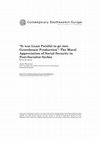
"It was least painful to go into greenhouse producton": The Moral Appreciation of Social Security in Central Serbia", in: Contemporary Southeastern Europe 1 (2): 24-41., Nov 2014
This paper deals with the agricultural production of social security. By representing a rural ca... more This paper deals with the agricultural production of social security. By representing a rural case study from Central Serbia, it contributes to the economic history of post-socialist former Yugoslavia and explores the conditions of the possibility for social alternatives to neo-capitalism. In the
case study, a male actor - embedded within family and wider social networks - successfully accommodates the adverse macroeconomic conditions through hard work, micromanagement of limited resources, and the production of social relations. He also combines new micro-spatial
fixings - productive facilities - with revaluing morally depreciated older ones. In sum, this case study shows how networks of actors can invest their energy into reversing the moral depreciation of labor and capital under conditions of capitalist competition and growing inequality. These practices point to an emancipation from the inegalitarian moral economy of capitalism, a process I conceptualize as “moral appreciation”.As its goal emerges the production of a relatively egalitarian society within the lived space of the urban-village continuum.
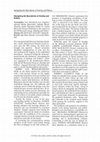
The conceptual split between kinship and politics, which characterized Western social science sin... more The conceptual split between kinship and politics, which characterized Western social science since the 19th century, has lately been brought into question. Recent researches identified entanglements of state and kin and confirmed the fragility of the established boundaries. Aiming to bridge the aforementioned divide, the conference „Navigating the Boundaries of Kinship and Politics,“ which was organized by the postdoctoral fellows from the ZiF Research Group on „Kinship and Politics,“ engaged historians and anthropologists in a lively interdisciplinary discussion. KEEBET VON BENDA-BECKMANN (Halle an der Saale) opened the conference with a first keynote lecture on the legally constructed boundaries between kinship and politics. Considering case studies on property relations, mainly from Indonesia, von BendaBeckmann showed that kinship was not only (re)defined through law, but authority and economic power within kin groups were also shifted because of some imposed laws. By introducin...
Public Anthropologist, 2018
Doing Politics – Making Kinship: Back towards a future Anthropology of Social Organisation and Belonging, May 21, 2014
Report by Tabea Häberlein and me about the international workshop at Re:work Berlin, held in Febr... more Report by Tabea Häberlein and me about the international workshop at Re:work Berlin, held in February 2014. The idea of the workshop and this review is to reappreciate the dialectical interdependence of politics and social relations.
Book Reviews by André Thiemann
Čarna Brković (2017), Managing Ambiguity: How Clientelism, Citizenship, and Power Shape Personhood in Bosnia and Herzegovina (Oxford: Berghahn), 208 pp., $120.00/£85.00, ISBN 9781785334146., 2018
David W. Montgomery, ed, Everyday Life in the Balkans (André Thiemann), in Suedosteuropa 67(2), 2019
Conferences by André Thiemann
EASA Conference in Barcelona, 2024
Not only food producers use loaded designations that highlight certain features of their agricult... more Not only food producers use loaded designations that highlight certain features of their agricultural practices over others; so do social movements, legal systems, or grant regulations. This panel addresses the discrepancy between common terms for agricultural occupations and the realities we study.



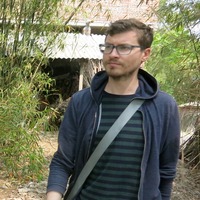







Uploads
Papers by André Thiemann
The first is critical historical-anthropological engagement, emphasising non-Western agency at the frontiers of the world-system. The second was marked initially by a hopeful embrace of, and then productive irritation and finally disenchantment with, neoliberal globalisation. This was marked by calling commodity chains ‘global commodity chains’ in the 1990s and ‘global value chains’ around 2000. These have affinities with other analytical concepts, including supply chains, supply-chain capitalism, production networks, clusters and value chains, each with its own orientation toward international capitalist production. Globalisation was analysed as a set of effects of the strategies of transnational firms, commercial sectors and countries to exploit cost differentials with peripheral locations. These globalisers shifted their unprofitable, labour-intensive and socio-environmentally hazardous operations to those locations while retaining their research and development, branding and financial planning. The destructive effects of this became evident with the economic crisis of 2008. Subsequently, a third approach emerged as anthropologists began to study the exploitation and resistance of human and non-human beings and entities within, against and tentatively beyond the ‘capitalocene’ (see Hirsch chap. 16, this vol.). I discuss these three reactions in turn.
between agroscientists and farmers and aggravated the problems these actors face today, including labour shortages and price fluctuations because of a diminishing ‘quality’ of ‘their’ product.
Keywords: anthropology of the state, boundary work, elder care, kinship, relational approach to the state, Serbia, state images, state kinning
case study, a male actor - embedded within family and wider social networks - successfully accommodates the adverse macroeconomic conditions through hard work, micromanagement of limited resources, and the production of social relations. He also combines new micro-spatial
fixings - productive facilities - with revaluing morally depreciated older ones. In sum, this case study shows how networks of actors can invest their energy into reversing the moral depreciation of labor and capital under conditions of capitalist competition and growing inequality. These practices point to an emancipation from the inegalitarian moral economy of capitalism, a process I conceptualize as “moral appreciation”.As its goal emerges the production of a relatively egalitarian society within the lived space of the urban-village continuum.
Book Reviews by André Thiemann
Conferences by André Thiemann
The first is critical historical-anthropological engagement, emphasising non-Western agency at the frontiers of the world-system. The second was marked initially by a hopeful embrace of, and then productive irritation and finally disenchantment with, neoliberal globalisation. This was marked by calling commodity chains ‘global commodity chains’ in the 1990s and ‘global value chains’ around 2000. These have affinities with other analytical concepts, including supply chains, supply-chain capitalism, production networks, clusters and value chains, each with its own orientation toward international capitalist production. Globalisation was analysed as a set of effects of the strategies of transnational firms, commercial sectors and countries to exploit cost differentials with peripheral locations. These globalisers shifted their unprofitable, labour-intensive and socio-environmentally hazardous operations to those locations while retaining their research and development, branding and financial planning. The destructive effects of this became evident with the economic crisis of 2008. Subsequently, a third approach emerged as anthropologists began to study the exploitation and resistance of human and non-human beings and entities within, against and tentatively beyond the ‘capitalocene’ (see Hirsch chap. 16, this vol.). I discuss these three reactions in turn.
between agroscientists and farmers and aggravated the problems these actors face today, including labour shortages and price fluctuations because of a diminishing ‘quality’ of ‘their’ product.
Keywords: anthropology of the state, boundary work, elder care, kinship, relational approach to the state, Serbia, state images, state kinning
case study, a male actor - embedded within family and wider social networks - successfully accommodates the adverse macroeconomic conditions through hard work, micromanagement of limited resources, and the production of social relations. He also combines new micro-spatial
fixings - productive facilities - with revaluing morally depreciated older ones. In sum, this case study shows how networks of actors can invest their energy into reversing the moral depreciation of labor and capital under conditions of capitalist competition and growing inequality. These practices point to an emancipation from the inegalitarian moral economy of capitalism, a process I conceptualize as “moral appreciation”.As its goal emerges the production of a relatively egalitarian society within the lived space of the urban-village continuum.